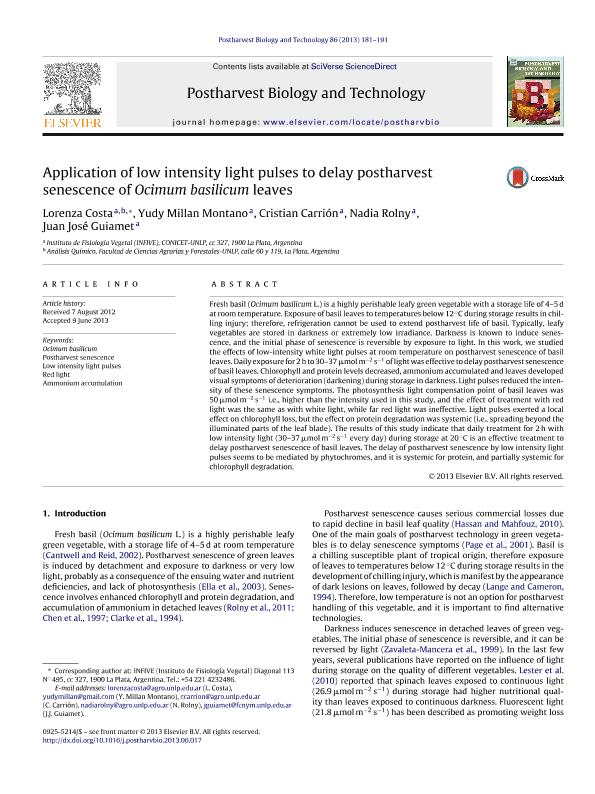Artículo
Application of low intensity light pulses to delay postharvest senescence of Ocimum basilicum leaves
Costa, M.lorenza ; Millan Montano, Yudy; Carrión, Cristian Antonio
; Millan Montano, Yudy; Carrión, Cristian Antonio ; Rolny, Nadia Soledad
; Rolny, Nadia Soledad ; Guiamet, Juan José
; Guiamet, Juan José
 ; Millan Montano, Yudy; Carrión, Cristian Antonio
; Millan Montano, Yudy; Carrión, Cristian Antonio ; Rolny, Nadia Soledad
; Rolny, Nadia Soledad ; Guiamet, Juan José
; Guiamet, Juan José
Fecha de publicación:
12/2013
Editorial:
Elsevier Science
Revista:
Postharvest Biology and Technology
ISSN:
0925-5214
Idioma:
Inglés
Tipo de recurso:
Artículo publicado
Resumen
Fresh basil (Ocimum basilicum L.) is a highly perishable leafy green vegetable with a storage life of 4–5 d at room temperature. Exposure of basil leaves to temperatures below 12 ◦C during storage results in chilling injury; therefore, refrigeration cannot be used to extend postharvest life of basil. Typically, leafy vegetables are stored in darkness or extremely low irradiance. Darkness is known to induce senescence, and the initial phase of senescence is reversible by exposure to light. In this work, we studied the effects of low-intensity white light pulses at room temperature on postharvest senescence of basil leaves. Daily exposure for 2 h to 30–37 mol m−2 s−1 oflight was effective to delay postharvest senescence of basil leaves. Chlorophyll and protein levels decreased, ammonium accumulated and leaves developed visual symptoms of deterioration (darkening) during storage in darkness. Light pulses reduced the intensity of these senescence symptoms. The photosynthesis light compensation point of basil leaves was 50 mol m−2 s−1 i.e., higher than the intensity used in this study, and the effect of treatment with red light was the same as with white light, while far red light was ineffective. Light pulses exerted a local effect on chlorophyll loss, but the effect on protein degradation was systemic (i.e., spreading beyond the illuminated parts of the leaf blade). The results of this study indicate that daily treatment for 2 h with low intensity light (30–37 mol m−2 s−1 every day) during storage at 20 ◦C is an effective treatment to delay postharvest senescence of basil leaves. The delay of postharvest senescence by low intensity light pulses seems to be mediated by phytochromes, and it is systemic for protein, and partially systemic for chlorophyll degradation.
Archivos asociados
Licencia
Identificadores
Colecciones
Articulos(INFIVE)
Articulos de INST.DE FISIOLOGIA VEGETAL
Articulos de INST.DE FISIOLOGIA VEGETAL
Citación
Costa, M.lorenza; Millan Montano, Yudy; Carrión, Cristian Antonio; Rolny, Nadia Soledad; Guiamet, Juan José; Application of low intensity light pulses to delay postharvest senescence of Ocimum basilicum leaves; Elsevier Science; Postharvest Biology and Technology; 86; 12-2013; 181-191
Compartir
Altmétricas



